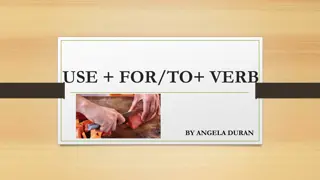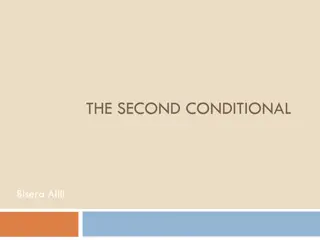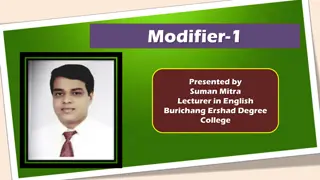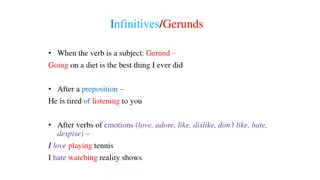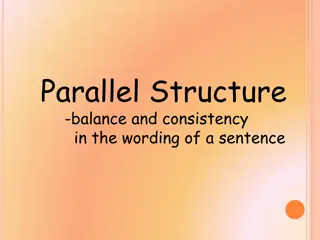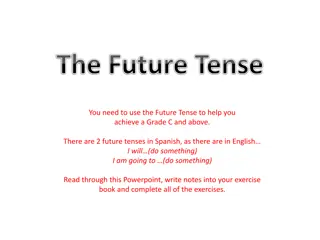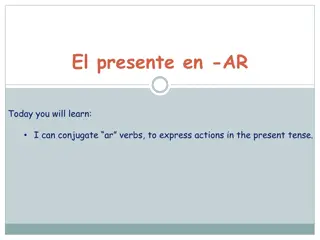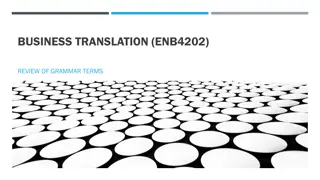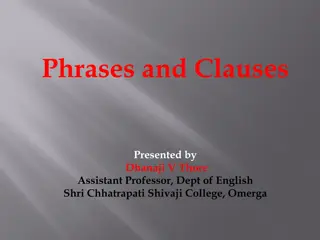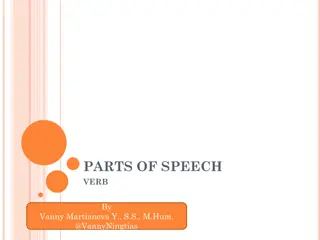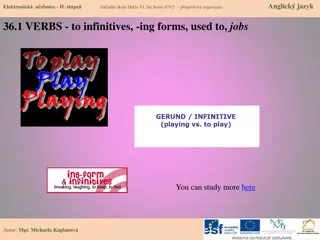INFINITIVE vs GERUND
Understand the difference between infinitives and gerunds in sentence structure. Explore how each form functions within sentences and how they impact overall meaning. Gain insights into when to use infinitives and gerunds effectively to enhance your writing skills and language proficiency. Dive into practical examples and exercises to master the usage of these components in various contexts.
Download Presentation

Please find below an Image/Link to download the presentation.
The content on the website is provided AS IS for your information and personal use only. It may not be sold, licensed, or shared on other websites without obtaining consent from the author.If you encounter any issues during the download, it is possible that the publisher has removed the file from their server.
You are allowed to download the files provided on this website for personal or commercial use, subject to the condition that they are used lawfully. All files are the property of their respective owners.
The content on the website is provided AS IS for your information and personal use only. It may not be sold, licensed, or shared on other websites without obtaining consent from the author.
E N D
Presentation Transcript
INFINITIVE vs GERUND Inna Kriger School 32 Prokopyevsk
INFINITIVE TO [ to + V ] 1. : She went to the supermarket to buy some cheese. 2. (agree, appear, decide, expect, hope, plan, promise, refuse, want, etc.) SOMEBODY TO DO SOMETHING: I expect him to be here. I want you to come. She hopes them to arrive without delays. , 3. WOULD LIKE, WOULD PREFER, WOULD LOVE: I would love to come to your party.
INFINITIVE TO [ to + V ] 4. , (happy, glad, sad, (eager, reluctant, (clever, kind, etc.), - : I was sad to hear you were not feeling well. She was eager to help him. He was lucky to win the competition. etc.), willing, / etc.), lucky fortunate 5. TOO, ENOUGH: She s old enough to watch the film. 6. BE + the first/second/next/last, etc.: She was the first person to call me on my birthday.
INFINITIVE TO [ to + V ] 7. ( ) ask, decide, explain, find out, learn, want, want to know, etc., (where, when, etc.): She asked me where to get the tickets. 8. : to tell you the truth, to be honest, to sum up, to begin with: To sum up, the government needs to take measures to deal with unemployment more effectively. 9. (honor, goal, way, etc.): It s an honor to take part in this festival. You can find a better way your time.
INFINITIVE TO [ to + V ] 10. SO + Adjective + AS: Would you be so kind as to help me with the door? 11. ONLY, : She drove all the way to the mall only to find it was closed. 12. FOR+NOUN/PRONOUN: It was very unusual for John to speak so rudely.
INFINITIVE TO [ V ] 1. : Sally can speak Portuguese fluently. 2. LET, MAKE, SEE, HEAR, WATCH, NOTICE, FEEL + SOMEBODY (Complex Object): They let him travel on his own. ! be made, be heard, be seen ( Passive Voice) TO! She was seen to speak to flowers in her garden. 3. HAD BETTER, WOULD RATHER: You had better put a jacket on. ! HELP TO TO She helped me (to) carry the baggage.
GERUND [ Ving ] 1. : Exercising is good for your health. 2. admit, appreciate, avoid, consider, continue, deny, fancy, go (for adj.), imagine, mind, miss, practise, prevent, quit, save, suggest: You should avoid eating junk food. I appreciate your coming. 3. love, like, enjoy, prefer, dislike, hate : Brian prefers walking alone. 4. be busy, it s no use, it s no good, it s (not) worth, what s the use of, can t help, there s no point (in), can t stand, have difficulty (in), have trouble, etc.: I have difficulty (in) understanding what he says.
GERUND [ Ving ] 5. spend, waste, lose (time, money): He spends an hour playing the guitar every day. 6. , : think of, apologise for, object to, look forward to, be used to, in addition to: She s looking forward to receiving a letter from him. I was thinking of calling John. 7. PREFER: She prefers walking to driving on the way to work. 8. hear, listen to, notice, see, watch, feel ( ): I saw Paul waiting for the bus. ! to: I didn t see Paul get on the bus.


